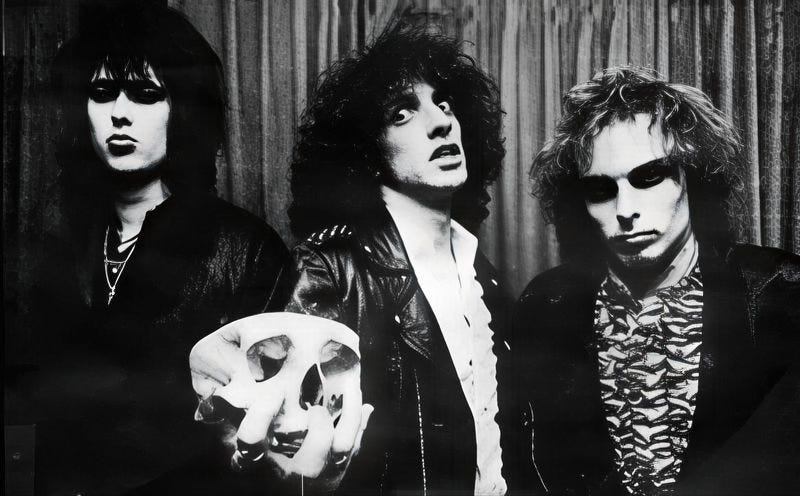Coroner | History of the Band
Switzerland’s Tech-Thrash Time Bomb
Ever wonder what would happen if your roadies formed one of the tightest, weirdest, most technical thrash bands of the '80s? That’s pretty much the story of Coroner.
Born in the shadow of Celtic Frost’s looming legacy, Coroner emerged from Zurich’s underground in 1983. At first, it looked like they might chase Mötley Crüe-style glam. But when guitarist Oliver Amberg left for Frost’s infamous Cold Lake detour, drummer Marky Edelmann reshuffled the deck. He teamed up with fellow Celtic Frost crew members Ron Broder (aka Ron Royce) on bass/vocals and Tommy Vetterli (aka Tommy T. Baron) on guitar. That trio—the core of Coroner’s legacy—locked in by 1985.
And get this: their first demo, Death Cult, featured vocals from none other than Tom G. Warrior. Yep, the guys who used to tune Celtic Frost's guitars had the Frost frontman howling on their tapes. But by their 1987 debut R.I.P., Royce had claimed the mic, completing their metamorphosis into a power trio with brains, brawn, and an experimental streak.
Chuck Marshall suggested this artist for a future Dig Me Out podcast episode. Each month, our Paid Subscribers are presented with a selection of albums suggested by listeners and asked to vote for their favorite.
From the start, Coroner fused the speed of Slayer, the darkness of Frost, and the complexity of Rush. They signed with Noise Records, entered Berlin’s Music Lab with Harris Johns (he of early Helloween and Sodom fame), and set the stage for something wild: technical thrash that played like classical music on amphetamines.
Musical Style and Evolution
Coroner were never just a thrash band.
They were the Rush of thrash. The King Crimson of speed. They made metal for listeners who read liner notes and didn’t mind a few odd time signatures along the way.
Their songs swerved from neoclassical guitar lines to fusion-inspired rhythms. Just listen to "Totentanz," which lifts a 17th-century bourrée into headbang territory. Or the way "Masked Jackal" delivers social commentary over a riff sharp enough to shave your skull. Unlike many thrash acts of the time, Coroner didn't just speed up—they twisted their songs, rewrote their own playbook with each album, and never made the same record twice.
Royce once said, "Every album should set itself apart from the preceding one." And they lived that mantra: R.I.P. was raw but clever; Punishment for Decadence got tighter, nastier, more political; No More Color was jazz-thrash at its apex, with pristine production and razor-sharp arrangements.
Discography and Notable '80s Albums
R.I.P. (1987)
It starts like a horror soundtrack. Then it explodes. R.I.P. was Coroner's big hello to the world: shredding, theatrical, dense with promise. Tracks like "Reborn Through Hate" and "When Angels Die" are high-speed headtrips, with eerie acoustic intros and tempo changes that snap your neck sideways.
The production? A little raw. But the ambition was undeniable. You could already hear Coroner pushing at the boundaries of what thrash could be.
Punishment for Decadence (1988)
This is where it clicks.
Sharper production, meatier riffs, and a political edge. "Masked Jackal" is the anthem, a snarling takedown of political hypocrisy that landed them airtime on Headbangers Ball. Instrumental "Arc-Lite" proves Coroner could out-shred almost anyone. The band even tackled Hendrix's "Purple Haze," turning it into a frantic, metallic spiral.
It was their statement piece: yes, we’re brainy, but we still crush.
No More Color (1989)
Eight songs. Thirty-four minutes. Zero filler.
By now, Coroner had become something else entirely: masters of prog-thrash, layering jazz, funk, and classical motifs into relentless, intricate metal. "Die By My Hand" kicks things off with pure fury and finesse. "Read My Scars" and "Mistress of Deception" blend complexity with hooks. Even the bass—usually buried in thrash mixes—gets its moment to shine.
Mixed at Morrisound by death metal legend Scott Burns, No More Color sounds crisp, tight, devastating. It’s not just their best '80s album; it might be one of the best thrash albums, period.
Critical Reception in the '80s
They never broke big.
But ask any die-hard metalhead in 1989 who the most underrated band in the scene was? Coroner came up. A lot.
Magazines like Metal Forces, Rock Hard, and niche zines across Europe hailed their innovation. MTV's Headbangers Ball gave them just enough exposure to earn cult status. Kerrang! even admitted their sound was closer to Living Colour than Hellhammer.
Coroner were the band you bragged about knowing. The one you lent your buddy a dubbed tape of and said, "You’re not ready for this."
Influence and Legacy
You know who loved Coroner? Chuck Schuldiner from Death. Mike Portnoy from Dream Theater. Fenriz from Darkthrone. The influence ran deep and wide—thrash, death, progressive, even alternative metal acts took notes.
Coroner weren’t just fast; they were smart. They showed that metal could think, could evolve, could play with form without losing fire. You can hear their DNA in bands like Gojira, Vektor, even early Meshuggah.
After disbanding in the '90s, they reunited in the 2010s to play festivals and reissue their catalog, cementing their place as a buried treasure finally unearthed.
Coroner were the real deal. A band that slipped through the cracks during metal’s biggest decade, only to be recognized later as visionaries.
Their '80s work? It holds up. It's still strange. Still sharp. Still thrilling. For metal fans who remember discovering "Masked Jackal" at 1 a.m. on MTV, it’s a flashback to a time when music felt like a secret code. For younger fans, it's a deep cut worth every second of excavation.




Thanks for covering this fantastic band!! I've had the good fortune to see them back in the day (early 90's) and at the Maryland Deathfest a few years back :)